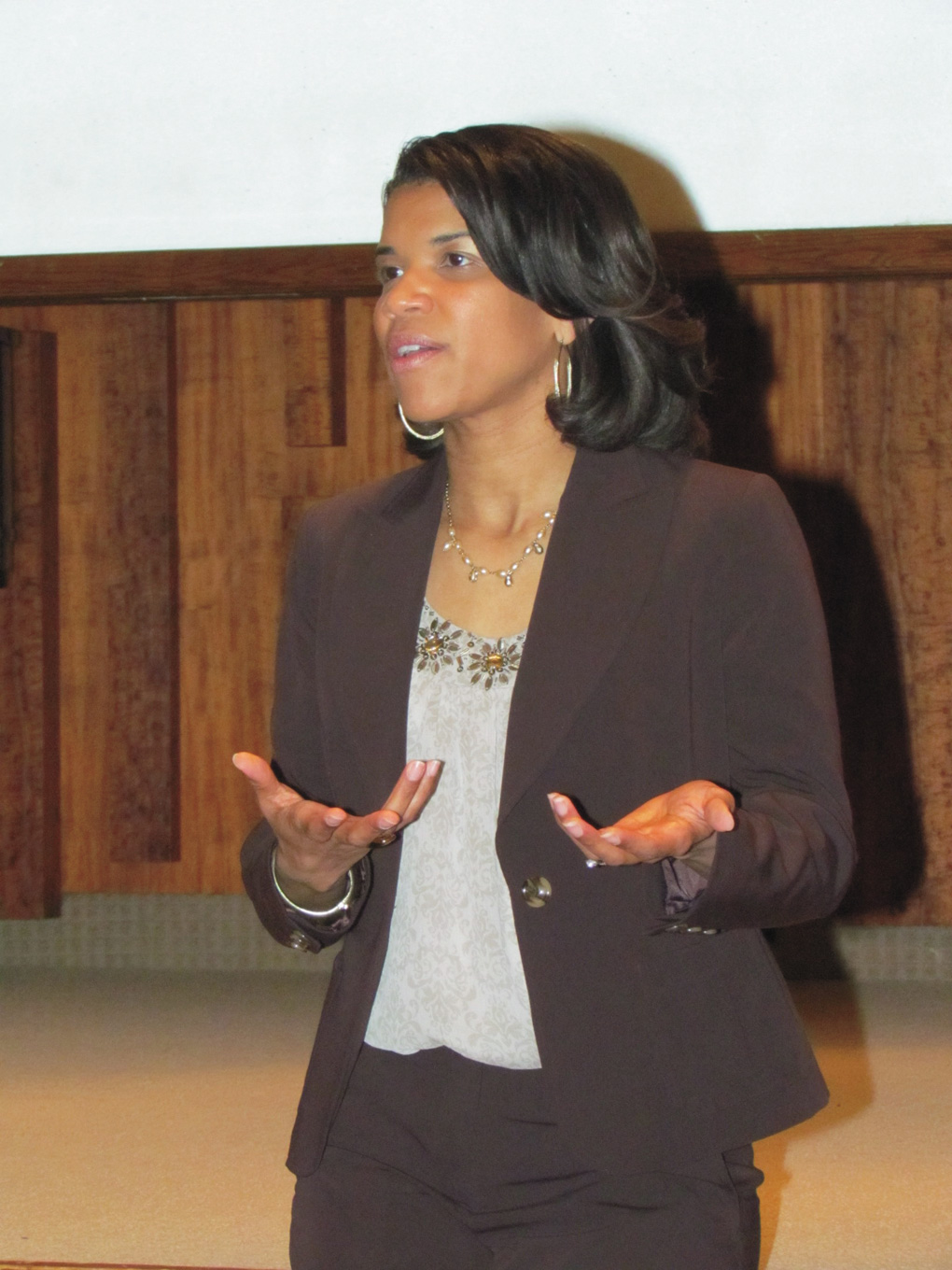More than 15 years after being sentenced to 24-1/2 years in prison, receiving one of the toughest sentences for a first time non-violent offender, Kemba Smith, now Kemba Smith Pradia, is still telling her story so others can learn from the mistakes she made.
As a part of their Women’s History Month celebration, Carlow University’s Black Student Union, the Office of Diversity Initiatives and the Women’s Studies Program, collaborated to hold a lecture on March 22 featuring Smith and her journey through getting mixed up with the wrong crowd, being in an abusive relationship and struggling to break free, facing a harsh sentence, getting her freedom back and overcoming it all.
“It’s important to love yourself, have high self-esteem, understand your limits and standards and never lower your standards,” Smith said is the advice she now gives to young women. “I hope by telling my story people learn from it.”
Smith grew up in Richmond, Va. and was the only child to professional parents. Some still find it hard to believe someone with a solid family background could get “caught up” like she did and make such a terrible decision.
After graduating high school in 1989, Smith attended Hampton University, where she would meet the then love of her life.
“I was on campus, a new student, wanting to fit in with the “cool” students. I would see him pick-up girls, he had different cars,” she said about Peter Michael Hall, a known and long-time drug dealer. “So when he showed interest in me, (she was excited), I had the mentality that whatever he did was his thing.” Hall was known to recruit young college women to get involved in his drug ring. He died in 1994.
Their relationship started off great, but soon became abusive. In the May 1996 issue of Emerge Magazine, Smith told her story and recounted how Hall would often physically and emotionally abuse her. “He beat me real bad. With a belt. With a brush. With his hands. And then he tells me to go sit in some bath water. I’m starting to swell. I’m shaking and crying. He came in the bathroom and started asking more questions. When he wasn’t happy with my answers, he’d just hit me with the brush…” she recounted to the magazine.
Smith said although there were some red flags during her relationship she loved him and like many women do, thought if she stayed with him she could change him. “When the relationship turned abusive that love turned to fear and I felt I had to stay with him.” She later realized that she had to get out. For about four years she would make several attempts to leave, but for various reasons, she would come back. Also during that time, her grades dropped, she left Hampton and transferred to other schools, she moved around the country.
Throughout their relationship, Hall was in and out of jail. And federal agents were watching. According to Emerge magazine, Hall’s cocaine and crack cocaine drug ring, which included his brother, moved approximately $4 million in drugs.
In 1995, Smith was sentenced to 24 ? years in prison with no chance of parole for her involvement in the ring. She was charged with conspiracy, money laundering and lying to authorities. She had no prior record and no violent offenses and yet received a harsher sentence than that of some convicted murders.
Smith’s case was noticed and in 1996 the national NAACP’s Legal Defense and Educational Fund took her case pro bono. But it was in 2000, after serving more than six years in federal prison, Smith was freed when the President Bill Clinton granted her clemency.
“I do think there are some flaws in the justice system, but at the same time we have to be responsible for our actions and choices,” Smith said. “Even though I do advocacy work for drug policy reform, I do take responsibility for my actions. Fortunately I had parents that came out and spoke (on her behalf). It’s unfortunate that not everyone has that support.” she said. “When I left (prison), I left behind hundreds of Kemba Smith’s (individuals in situations like her or serving harsh sentences).”
While Smith does not like to say she has regrets, she said she has learned from it and just wishes she could have avoided carrying her parents through a lot of heartache and pain. And says that it was her parents, her faith of leaning on and trusting in God, several people in the community and most importantly, her son, who she gave birth to in December 1994.
“He doesn’t realize he’s helped to keep me strong. My release date wouldn’t have been until he was 23 years old and grown.”
She says in order to reach young people, individuals, as adults, need to be innovative when reaching out to their children and says she strongly believes in the old adage, it takes a village to raise a child.
Now Smith has moved on. “I’ve taken on wanting to move forward,” she said. Since her ordeal, Smith has went back to college and graduated, started the Kemba Smith Foundation, is living in Indianapolis, where she is self-publishing a book and is now married and has a 16-year-old son and a 1-year-old daughter. “I am grateful that God has let me experience a real healthy relationship.”
For more information on Smith, visit her website at www.kembasmithfoundation.org.
